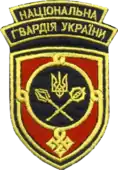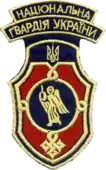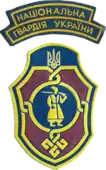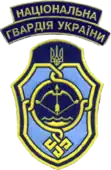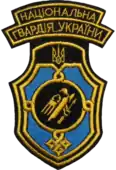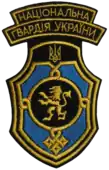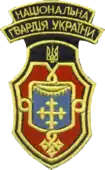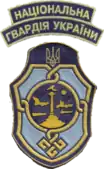National Guard of Ukraine
The National Guard of Ukraine (NGU; Ukrainian: Націона́льна гва́рдія Украї́ни, romanized: Natsionalna hvardiia Ukrainy, IPA: [nɐt͡s⁽ʲ⁾ioˈnɑlʲnɐ ˈɦʋɑrd⁽ʲ⁾ijɐ ʊkrɐˈjinɪ], abbr. НГУ) is the Ukrainian national gendarmerie and internal military force. It is part of the Ministry of Internal Affairs, responsible for public security. Originally created as an agency under the direct control of the Verkhovna Rada on 4 November 1991, following Ukrainian independence, it was later disbanded and merged into the Internal Troops of Ukraine in 2000 by then-President Leonid Kuchma as part of a "cost-saving" scheme. Following the 2014 Revolution of Dignity, amidst the Russian intervention, the National Guard was re-established, and the Internal Troops were disbanded.[1]
| National Guard of Ukraine Національна гвардія України | |
|---|---|
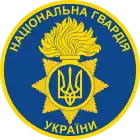 Patch of the National Guard | |
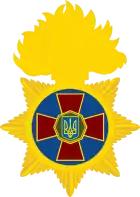 Emblem of the National Guard | |
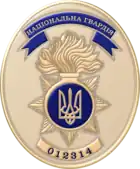 Badge of the National Guard | |
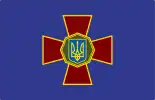 Ensign | |
| Abbreviation | NGU |
| Motto | Честь, Мужність, Закон Honor, Courage, Law |
| Agency overview | |
| Formed | March 13, 2014[1] |
| Preceding agency | |
| Employees | 60,000 (2022)[2] ~90,000 (2022)[3] |
| Jurisdictional structure | |
| Operations jurisdiction | Ukraine |
| Constituting instrument |
|
| General nature | |
| Operational structure | |
| Headquarters | Kyiv |
| Agency executive |
|
| Parent agency | Ministry of Internal Affairs |
| Notables | |
| Significant operations | |
| Anniversary |
|
| Website | |
| ngu | |
The objective of the National Guard is to serve as a military unit with law enforcement powers. Its mission is to ensure state security, protect the state borders (supporting the State Border Service), participate in activities to neutralize paramilitary armed groups, terrorist organizations, organized groups and criminal organizations, protect critical infrastructure such as Ukraine's nuclear power plants, as well as diplomatic missions, and buildings of the Ministry of Internal Affairs.[7] The NGU has sent personnel to UN peacekeeping missions.[8] During peacetime the National Guard focuses on civilian public security, combating organized crime and controlling civil unrest.[1] However, during wartime the National Guard can be mobilized as a regular military force and take part in combat operations alongside the Armed Forces of Ukraine,[1] which it has done during the war in Donbas[9] and the 2022 Russian invasion of Ukraine.[10]
History
Original formation
The NGU was originally created by the Law of Ukraine "On the National Guard of Ukraine" dated 4 November 1991, No. 1775 -XII. The National Guard was created on the basis of part of the Internal Troops of the Soviet Union in the Ukrainian SSR, while the Internal Troops of Ukraine also was established at almost the same time in 1992 as parts of the Ukrainian branch of the old Soviet Internal Troops.[11] The National Guard claimed to inherit the traditions and legacy of the Gendarmerie of the Ukrainian People's Republic, which existed from 1918 to 1919.[12]
During its early existence, the National Guard was indirectly involved in the Transnistria War of the Transnistria conflict during the spring and summer of 1992, helping to defend the border against a threatened spill-over of the conflict into Ukraine. Formations involved were the 3rd, 4th and 5th divisions NGU (equipment transferred from the 93rd Motorized Rifle Division was also used in this deployment). Afterwards, up until 1998, National Guard units backed up the border guards in anti-smuggling operations conducted on the border with Moldova and Moldova's breakaway Transnistria region. In 1994, the National Guard was also involved in the 1992-1994 Crimean Crisis, which was an attempted by the Autonomous Republic of Crimea to declare itself sovereign after the 1991 Crimean sovereignty referendum. The National Guard was sent to restore order and Ukrainian sovereignty over Crimea.[13]
In 1995, there were already calls for the dissolution of the National Guard by political opponents of the then-president Leonid Kuchma who accused him of dictatorial behavior after he resubordinated the guard to himself by decree. After Kuchma's re-election after the 1999 Ukrainian presidential election, the opposition continued to demand the extinction of the National Guard, which was done in 2000 as part of a concession to the opposition by Kuchma and justified as part of a "cost-saving scheme".[14]
The National Guard was dissolved by the Law of Ukraine "On Amendments and Additions to Certain Legislative Acts of Ukraine" dated 11 January 2000, and merged with the Internal Troops of Ukraine, while some NGU formations were reassigned to the Armed Forces of Ukraine and thus were included in the order of battle of the Ukrainian Ground Forces.[1]
Badges of the NGU 1991–2000
Reformation
In 2014, amidst Russian intervention to Crimea, the reformed force was created partially on the basis of the Internal Troops of Ukraine, with plans for the "Volunteer Battalions", militias and armed wings from certain of Ukraine's political parties and organisations, including the Euromaidan movement, to be also incorporated into it. Direct recruitment from military academies was also intended.[15] The National Guard was recreated in accordance with the Law of Ukraine "On the National Guard of Ukraine" [Law number 4393] dated 12 March 2014,[1] (the draft legislation being originally introduced to the Ukrainian parliament on 11 March). A previous attempt by then President Yushchenko to bring back the National Guard during civil unrest in 2008 had been blocked in the Rada. It was finally re-established in March 2014 after the beginning of the Crimean crisis.[16] On 16 March, the Yatsenyuk Government announced plans to recruit 10,000 people within the next 15 days for the by now revived National Guard.[17] Individual volunteers were also accepted.
The 2014 law provided for an initial authorised strength of 33,000 personnel. It also tasks the National Guard with maintaining public order, protecting sites like nuclear power plants and "upholding the constitutional order and restoring the activity of state bodies",[18] in part a reference to the situation in Crimea, as well as to the perceived Russian threat to Ukraine as a whole. In the eastern parts of the country in particular, not only will the National Guard reinforce regular military units defending against a feared Russian invasion, it will also be expected to uphold Part 1 of Art. 109 of the Criminal Code of Ukraine [lower-alpha 1] (i.e. it is intended to act as a counterinsurgency force against fifth columnists and infiltrators).
The National Guard will be receiving a large proportion of the money from the emergency budgetary reprogramming approved by parliament for the funding of weapons procurement, equipment repair, and training (said reprogramming is equivalent to $600 million in 2014 Dollars).[19] It is hoped that, eventually, the strength of the National Guard will rise to 60,000 personnel. The pay for National Guard regulars is approximately 214 Euros ($297) a month, equivalent to an average Ukrainian's monthly income. Officers receive about twice that amount.[20] There are also some attached Internal Troops personnel, mostly for training and/or logistical support purposes,
e.g. K-9 teams that have been taking part in training and demonstration sessions.
During the ongoing war in the Donbas region of Ukraine, the forces of the revived National Guard have fought against pro-Russian separatists and Russian troops disguised as separatists. Due to lack of reserves, earlier in the conflict willing civilians and political groups created their own militias and paramilitary groups, known as the "Volunteer Battalions", to fight the separatists on their own.[21] The Battalions were credited to have held the line against the separatists and allowed the National Guard and the Armed Forces to reorganize and strike back. Some of the Battalions were placed under the aegis of the Ministry of Internal Affairs[21] Two of them were the Azov and Donbas battalions, which were the largest volunteer units by far with a strength of 1,000 and 900 soldiers. Due to the size and operational success of those Battalions, they were transferred to be under the command of the National Guard.[22][23][24][25]
On May, the National Guard saw one of its first combat operations at the First Battle of Mariupol, where they clashed with pro-Russia militants and demonstrators during the unrest in Mariupol. They first attempted to occupy several government buildings before they were routed by National Guard riot troops, but soon the unrest evolved into heavy fighting between government and separatist militia forces.[26][27] Around the same time on May, separatist troops captured the terminal buildings of Donetsk International Airport, the National Guard circled the separatist forces, issuing an ultimatum demanding the surrender of the separatists — which was denied — and the paratroopers launched an assault on the airport. The incident became known as the First Battle of Donetsk Airport.[28] On the same month, National Guard Major General Serhiy Kulchytsky was killed during the Siege of Sloviansk, when his helicopter was shot down by separatists.[29] On early June, a Border Guard base and a National Guard were besieged in Luhansk and after 10 hours of battle the base fell after the guardsmen ran out of ammunition.[30]
On October 13, several National Guards troops protested outside the Ukrainian presidential administration building in Kyiv, they demanded the end of conscription and their own demobilisation. According to Kyiv Post, many of the protesters were former Internal Troops who had clashed with Euromaidan protesters, and they were not in favour of that movement or the new government.[31]
Three National Guardsmen died in a riot on 31 August 2015 at the Verkhovna Rada when a policeman on leave threw a grenade outside the facade.[32]
According to official figures, by mid-April 2016, the Interior Ministry and the National Guard have lost 308 personnel since the war in Donbas broke out, including 108 from the National Guard's volunteer battalions.[33]
Russo-Ukrainian War
Beginning Thursday, 24 February 2022, the day the Russian Armed Forces invaded Ukraine,[10] the NGU has been active in many of the land battles fought by Ukrainian forces during the current war.
On the first day of the war, the Russian Airborne Forces (VDV) attempted an air assault on the Antonov Airport in Hostomel, northwest Kyiv, in order to do an air lift and bring more troops and heavier equipment to the capital in a military engagement that became known as the Battle of Antonov Airport. In the initial phases of the assault, the VDV expelled a small garrison of the National Guard and took control of the airport. However, the 4th Rapid Reaction Brigade of the Ukrainian National Guard swiftly reacted by launching an extensive counter-attack, using armored vehicles and artillery, that encircling the unsupported Russian troops and repelled the attack.[34] The airport was captured by a renewed Russian offensive the next day, but the airport was rendered unusable by battle damage. The actions of the 4th Brigade were credited with preventing the quick capitulation of Kyiv,[35] and led to the Russian Offensive on Kyiv stalling and eventually withdrawing.[35]
169 National Guard troops were captured after the Battle of Chernobyl. Russian Ministry of Foreign Affairs claimed that "Currently, control over the situation at the Chernobyl NPP is being exercised jointly by Russian servicemen, Ukrainian specialists, the plant's civilian personnel, and that country's National Guard".[36] But later reports indicated they were captured and locked in a bunker for 30 days.[37] On 6 April, the Ukrainians officially announced the National Guard had retaken and reestablished control over the Chernobyl Nuclear Power Plant.[38]
The Azov Regiment was heavily involved in the Siege of Mariupol, being one of the primary defenders of the city.[39] The other units of the National Guard defending the city were the 23rd Separate Protection of Public Order Brigade 12th Operational Brigade.[40] The Azov's origins as a neonazi and ultranationalist militia, and its legitimization by the Ukrainian government and inclusion in the official structure of the National Guard has been a point of contention. It has been used by Russia to paint the Ukrainian government as Nazi-leaning, as justification for the brutality in Mariupol and as a casus belli for the invasion itself.[41]
After the retreat of Russian forces from the Kyiv axis, the 4th Rapid Reaction Brigade was redeployed to the East Ukraine, to fight at the Eastern Ukraine offensive.[42] In the east, unit was involved at the Battle of Severodonetsk and Lysychansk, where they fought a month-long defense of the twin cities.[43][44] And later in the year, the unit was deployed at Bakhmut to fight in the grueling Battle of Bakhmut.[45]
The National Guard began the raising of an additional 6 "Offensive Guard" Infantry Brigades in February 2023 to bolster its fighting forces under the recommendation of the Ministry of Internal Affairs, with the remaining two under other agencies.[46] These brigades, unlike those under Army wartime control, report directly to NGU General Headquarters in Kyiv through operational commanders. Under these circumstances, and with most of the former Azov Regiment veterans of Mariupol (by now released if living) and other battles now reporting under the Armed Forces' overall command, the regiment was reflagged and reactivated, this time, as a National Guard Offensive Infantry Brigade, organized in like manner as the rest of its fellow brigades.
Structure
The National Guard of Ukraine is a military force under the command of Ukrainian Ministry of Internal Affairs, and is tasked to protect public order, strategically important facilities and counter illegal paramilitary groups.[47] Originally formed in 1991, in 2000 the National Guard was disbanded due to financial issues and restored in 2014 after the Maidan revolution on the basis of the former Internal Troops of Ukraine, which formerly co-existed with the first iteration of the NGU.[48] During martial law periods, the units of National Guard are subordinated to Ukrainian Armed Forces.[45]
As of 2023 the National Guard is structured in five Operational-Territorial Commands:
- Central Administration, Dnipro, Dnipro Oblast
- Eastern Administration, Kharkiv, Kharkiv Oblast
- Northern Administration, Kyiv, Kyiv Oblast
- Southern Administration, Odesa, Odesa Oblast
- Western Administration, Lviv, Lviv Oblast
Directly reporting formations under GHQ National Guard
- National Guard Headquarters Protection & Support Battalion
- 22nd Diplomatic Missions & Consular Posts of Foreign States Protection Brigade
- National Guard Air Base/Air National Guard of Ukraine
- Military Band Service of the National Guard of Ukraine
Volunteer Units
- 12th Azov Assault Brigade, Yurivka, Donetsk Oblast
- Brigade HHC
- 1st Company
- 2nd Company
- 3rd Company
- 4th Company
- Donbas Battalion, Sloviansk, Donetsk Oblast
- 1st Company
- 2nd Company
- Detachment Dome
- Kruk Battalion, Ivano-Frankivsk, Ivano-frankivsk Oblast
- Kulchitskyi Battalion, Kyiv, Kyiv Oblast
- 1st Company
- 2nd Company
- 3rd Company
- Dnipro-1 Battalion, Dnipro, Dnipro Oblast
Operational Brigades
- 1st (Presidential) "Bureviy" (Storm) Brigade (Petro Doroshenko), Vyshorod, Kyiv Oblast
- 1st Guardsmen Battalion
- 2nd Guardsmen Battalion
- 3rd Guardsmen Battalion
- Field Artillery Battalion
- Anti-Aircraft Defense Battalion
- 3rd "Spartan" Brigade (Petro Bolbochan), Kharkiv, Kharkiv Oblast
- 1st Infantry Battalion
- 2nd Infantry Battalion
- 3rd Infantry Battalion
- 4th Guardsmen Battalion
- Tank Company
- Artillery Battalion
- Anti-Aircraft Defense Battalion
- Reconnaissance Company
- 4th "Rubizh" Rapid Reaction Brigade (Serhii Mikhalchuk), Hostomel, Kyiv Oblast
- 1st Infantry Battalion
- 2nd Infantry Battalion
- 3rd "Svoboda" Infantry Battalion
- 4th Infantry Battalion
- 6th Infantry Battalion
- Tank Company
- Artillery Regiment
- Anti-Aircraft Defense Battalion
- Reconnaissance Company
- 12th Operational Brigade, Mariupol, Donetsk Oblast
- 13th "Khartia" Brigade, Kharkiv Oblast
- 14th "Chervona Kalyna" Brigade (Ivan Bohun), Kalynivka, Vinnytsia Oblast
- 15th "Kara-Dag" Brigade (Oleksiyovych Zavada), Zaporizhzhia, Zaporizhzhia Oblast
- 1st Infantry Battalion
- 2nd Infantry Battalion
- 3rd Guardsmen Battalion
- Tank Company
- Artillery Battalion
- Anti-Aircraft Defense Battalion
- Reconnaissance Company
- 45th Operational Regiment, Lviv, Lviv Oblast
- Special Purpose unit Omega
- Special Intelligence Unit Ares
- Special Purpose unit Odesa
Protection of Public Order
- 11th Hrushevsky Brigade
- 16th Radievsky Brigade
- 19th Public Protection Regiment
- 21st Kalnyshevsky Brigade
- 23rd Khortytsia Brigade
- 25th Prince Askold Brigade, Kyiv, Kyiv Oblast
Mixed Units
- 2nd Galician Brigade
- 5th Slobozhansk Brigade
- 11th Separate Battalion
- 12th Separate Battalion
- 13th Separate Battalion
- 15th Slovyansk Regiment
- 16th Separate Battalion
- 18th Separate Battalion
- 22nd Separate Battalion
- 25th Separate Battalion
- 26th Separate Battalion
- 32nd Separate Battalion
- 40th Nechay Regiment
- 50th Vysochan Regiment
- 75th Separate Battalion
Transport Protection Units
- 14th Separate Battalion
- 15th Separate Battalion
- 19th Separate Battalion
- 27th Pechersk Brigade
- 34th Separate Battalion
Commanders
- 1991–1995 Lieutenant General Volodymyr Kukharets[49]
- 1995–1996 Lieutenant General Oleksandr Kuzmuk[50]
- 1996–1998 Lieutenant General Ihor Valkiv[51]
- 1998–2000 Lieutenant General Oleksandr Chapovsky[52]
- 2000–2014 transferred to the Commander of Internal Troops
- 2014 Lieutenant General Stepan Poltorak
- 2014–2015 Lieutenant General Mykola Balan (acting)
- 2015–2019 Colonel General Yurii Allerov
- 2019–2022 Lieutenant General Mykola Balan[53]
- 2022– General Yuriy Lebid[53]
Training
New recruits (those not transferring in from the Internal Troops, Ground Forces or military academies) will undergo an initial two-week compressed training course, covering a range of areas from firearms and unarmed combat, to map reading and communications. Those signing up to be full-time members of the Guard will receive at least an additional four weeks of training.[lower-alpha 2] For those part-time members who complete their two-week training and return to their communities to await call-up, the authorities appear to be planning to implement a variation of the March battalion system; based where possible around existing civilian militias and armed groupings. Most of those use the sotnya as their basic unit, as does the National Guard itself.
In March 2015, the National Guard of Ukraine received training from the U.S. 173rd Airborne Brigade Combat Team. The training took place at the Yavoriv training center near the western Ukrainian city of Lviv. The 173rd Airborne paratroopers trained the Ukrainians on how to better defend themselves against "Russian and rebel artillery and rockets." Training also included securing roads, bridges, and other infrastructure and treating and evacuating casualties.[54]
Officers and NCOs of the NGU are trained under the aegis of the National Guard Military Academy of Ukraine.
Ranks and insignia
Officers
| Rank group | General / flag officers | Senior officers | Junior officers | Officer cadet | ||||||||||||||||||||||||||||||||
|---|---|---|---|---|---|---|---|---|---|---|---|---|---|---|---|---|---|---|---|---|---|---|---|---|---|---|---|---|---|---|---|---|---|---|---|---|
.svg.png.webp) |
.svg.png.webp) |
.svg.png.webp) |
.svg.png.webp) |
 |
 |
 |
 |
 |
 |
 |
||||||||||||||||||||||||||
| Генерал Heneral |
Генерал-лейтенант Heneral-leitenant |
Генерал-майор Heneral-maior |
Бригадний генерал Bryhadnyi heneral |
Полковник Polkovnyk |
Підполковник Pidpolkovnyk |
Майор Maior |
Капітан Kapitan |
Старший лейтенант Starshyi leitenant |
Лейтенант Leitenant |
Молодший лейтенант Molodshyi leitenant |
Kурсант Kursant | |||||||||||||||||||||||||
Other Ranks and NCOs
| Rank group | Senior NCOs | Junior NCOs | Enlisted | |||||||||||||||||||||||||||||||||
|---|---|---|---|---|---|---|---|---|---|---|---|---|---|---|---|---|---|---|---|---|---|---|---|---|---|---|---|---|---|---|---|---|---|---|---|---|
 |
 |
 |
 |
 |
 |
 |
 |
 |
 | |||||||||||||||||||||||||||
| Головний майстер-сержант Holovnyi maister-serzhant |
Старший майстер-сержант Starshyi maister-serzhant |
Майстер-сержант Maister-serzhant |
Штаб-сержант Shtab-serzhant |
Головний сержант Holovnyi serzhant |
Старший сержант Starshyi serzhant |
Сержант Serzhant |
Молодший сержант Molodshyi serzhant |
Старший солдат Starshyi soldat |
Солдат Soldat | |||||||||||||||||||||||||||
Long Service Medal
.png.webp) 25 years in service
25 years in service 20 years in service
20 years in service 15 years in service
15 years in service 10 years in service
10 years in service
Equipment
Gallery
.jpg.webp) National Guard K-9 unit at the JFO zone, 2019. |
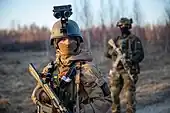 Soldiers of the National Guard of Ukraine in 2022. |
.jpg.webp) Female soldier of the NGU at a security checkpoint |
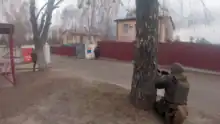 4th Rapid Reaction Brigade soldiers during the Battle of Hostomel Airport |
See also
- Novi Petrivtsi – Location of one of the training bases for the National Guard
- Territorial defence battalions (Ukraine)
- National Guard of Russia
Notes
- "Actions aimed at the violent overthrow, change of constitutional order, or the seizure of state power"
- However, at least one regular battalion has been stood up with only three weeks total of training.[Early April 2014]
References
- "Ukraine: National Guard Restored". Library of Congress. 4 April 2014. Retrieved 15 June 2020.
- Flanagan, Stephen J.; Kepe, Marta (26 February 2022). "What kind of resistance can Ukraine mount?". www.defensenews.com.
- Мільйон українців у формі захищає Україну від росіян
- "Zelenskyy appoints new commander of the National Guard".
- Yaroslav Mezentsev (10 May 2011). Холодна війна за Крим. Як ділили флот у 1990–х [Cold war over Crimea. How the fleet was divided in 1990.] (in Ukrainian). istpravda.com.ua.
- "President declares March 26 Day of National Guard". Interfax-Ukraine. 18 March 2015.
- "Завдання - НГУ". ngu.gov.ua. Retrieved 24 May 2022.
- "Офіційна сторінка миротворчої діяльності Нацгвардії України". nguinunpeaceoperations.tilda.ws. Retrieved 24 May 2022.
- "РАДА СТВОРИЛА НАЦІОНАЛЬНУ ГВАРДІЮ". Українська правда (in Ukrainian). Retrieved 13 April 2022.
- "Conflict in Ukraine". Global Conflict Tracker. Council on Foreign Relations. 28 February 2022. Retrieved 28 February 2022.
- "Про внесення змін до деяких законодавчих актів України". Офіційний вебпортал парламенту України (in Ukrainian). Retrieved 13 April 2022.
- "ЖАНДАРМЕРІЯ ЗАХІДНОУКРАЇНСЬКОЇ НАРОДНОЇ РЕСПУБЛІКИ". resource.history.org.ua. Retrieved 13 April 2022.
- Yaroslav Mezentsev (10 May 2011). Холодна війна за Крим. Як ділили флот у 1990–х [Cold war over Crimea. How the fleet was divided in 1990.] (in Ukrainian). istpravda.com.ua.
- БОДНЯ, Тетяна (26 March 2015). "Національна гвардія: на перших рубежах". Урядовий Кур’єр. Retrieved 12 June 2022.
- "Ukraine creates National Guard ahead of Crimea vote". BBC.com. 13 March 2014.
- В Украине объявили о создании Национальной гвардии: Начинается мобилизация опытных военных [The establishment of the National Guard of Ukraine is announced: Mobilization of expert military begins]. www.NR2.ru (in Russian). 11 March 2014. Archived from the original on 11 March 2014.
- Chris Morris (16 March 2014). "Kiev expects West response after Crimea vote". BBC.com.
- "Ukrainian National Guard". GlobalSecurity.org. Retrieved 24 March 2014.
- Anthony Faiola (17 March 2014). "Ukraine mobilizes reservists but relies on diplomacy". Washington Post. Retrieved 24 March 2014.
- Roman Goncharenko (20 March 2014). "Can the National Guard save Ukraine?". Deutsche Welle.
- "Добровольчі батальйони на Сході України: хто вони?". Uacrisis.org (in Ukrainian). 16 March 2015. Retrieved 8 April 2022.
- "Ultra-nationalist Ukrainian battalion gears up for more fighting". Reuters. 25 March 2015. Retrieved 15 June 2015.
- "Volunteers Bolster Ukraine's Fighting Force". Institute for War and Peace Reporting. Retrieved 15 June 2015.
- Ukraine underplays role of far right in conflict, BBC News (13 December 2014)
- "The women fighting on the frontline in Ukraine". The Guardian. 5 March 2015. Retrieved 15 June 2015.
- Post, Kyiv (9 May 2014). "Avakov says 21 dead in Mariupol after clashes between police and separatists on Victory Day (VIDEO) - May. 09, 2014". KyivPost. Retrieved 30 August 2022.
- "Ukraine forces briefly occupy city hall in eastern Mariupol". Reuters. 7 May 2014. Retrieved 30 August 2022.
- "Battle at Donetsk airport; new Ukraine leader says no talks with 'terrorists'". Reuters. 27 May 2014. Retrieved 30 August 2022.
- "Obituary: Major General Serhiy Kulchytsky". BBC News. 29 May 2014. Retrieved 23 December 2022.
- "6 militants killed, 3 Ukrainian troops injured in Luhansk - National | Globalnews.ca". Global News. Retrieved 30 August 2022.
- Sukhov, Oleg (14 October 2014). "Politicians, activists slam National Guard protest as unpatriotic - Oct. 14, 2014". KyivPost. Retrieved 30 August 2022.
- "Death Toll Rises To Three From Grenade Attack Near Ukrainian Parliament". Radio Free Europe/Radio Liberty. 2 September 2015. Retrieved 4 October 2018.
- "Avakov speaks of losses of National Guard". UNIAN. 18 April 2016. Retrieved 18 April 2016.
- Roblin, Sebastien (25 February 2022). "Pictures: In Battle for Hostomel, Ukraine Drove Back Russia's Attack Helicopters and Elite Paratroopers". 19FortyFive. Retrieved 12 April 2022.
- McGregor (8 March 2022). "Russian Airborne Disaster at Hostomel Airport | Aberfoyle International Security". Retrieved 12 April 2022.
- "Situation at Chernobyl NPP under joint control — Russian diplomat". TASS. 9 May 2022. Archived from the original on 13 March 2022. Retrieved 26 March 2022.
- Al-Arshani, Sarah. "169 Ukrainian National Guardsmen were locked in underground nuclear bunker by Russian forces that took over Chernobyl, report says". Business Insider. Retrieved 20 April 2022.
- "The National Guard of Ukraine units assumed control over the Chernobyl nuclear power plant". 6 April 2022. Retrieved 20 April 2022.
- Welle (www.dw.com), Deutsche. "The Azov Battalion: Extremists defending Mariupol | DW | 16.03.2022". DW.COM. Retrieved 12 April 2022.
- Zelenskyy, Volodymyr (19 March 2022). "Meaningful talks on peace and security for Ukraine are the only chance for Russia to reduce the damage from its own mistakes". President of Ukraine. Retrieved 2 April 2022.
- "The Azov Battalion: How Putin built a false premise for a war against "Nazis" in Ukraine". www.cbsnews.com. 22 March 2022. Retrieved 20 April 2022.
- "Watch Video: Ukrainian tank hits Russian armoured vehicle from long-range, destroys it completely". Free Press Journal. Retrieved 25 July 2022.
- "Ukrainians cede land on eastern front, but hold on to hope". news.yahoo.com. Retrieved 3 August 2022.
- "The soldiers of the National Guard of Ukraine showed how they blew up the bridge between Rubizhne and Sievierodonetsk". 18 May 2022.
- "Ніде на фронті не пасуємо перед ворогом, на визначених ділянках готуємо майбутні успіхи – звернення Президента України [Nowhere on the front are we grazing in front of the enemy, in certain areas we are preparing future successes - address of the President of Ukraine]". ПРЕЗИДЕНТ УКРАЇНИ ВОЛОДИМИР ЗЕЛЕНСЬКИЙ. 18 November 2022. Retrieved 16 December 2022.
- "Thousands of volunteers enroll in Ukraine's offensive brigades on first day of call". 6 February 2023.
- Detsch, Jack (March 2023). "How Ukraine Learned to Fight". Foreign Policy. Retrieved 2 March 2023.
- "Russo-Ukraine War - 01 March 2023". www.globalsecurity.org. Retrieved 2 March 2023.
- NGU Commander Guard Lt.General V. Kukharets. Spetsnaz NGU. 24 March 2013
- NGU Commander Guard Lt.General O.Kuzmuk. Spetsnaz NGU. 24 March 2013
- NGU Commander Guard Lt.Guard I.Valkov. Spetsnaz NGU. 24 March 2013
- NGU Commander Guard Lt.General O.Chapovsky. Spetsnaz NGU. 24 March 2013
- (in Ukrainian) Shooting in Dnipro: Zelensky officially fired the commander of the National Guard, TSN (27 January 2022)
- Fox News
- "НАКАЗ 20.11.2017 № 606". zakon.rada.gov.ua (in Ukrainian). Ministry of Justice of Ukraine. 13 December 2017. Retrieved 2 June 2021.
External links and further reading
 Media related to National Guard of Ukraine at Wikimedia Commons
Media related to National Guard of Ukraine at Wikimedia Commons- Official website
- National Guard recruitment webpage, operated by the Ministry of Internal Affairs Archived 29 June 2015 at the Wayback Machine (In Ukrainian). Accessed 29 March 2014.
- Spetsnaz NGU. Unofficial website.
- Taras Kuzio, "The non‐military security forces of Ukraine." The Journal of Slavic Military Studies 13, no. 4 (2000): 29–56.
